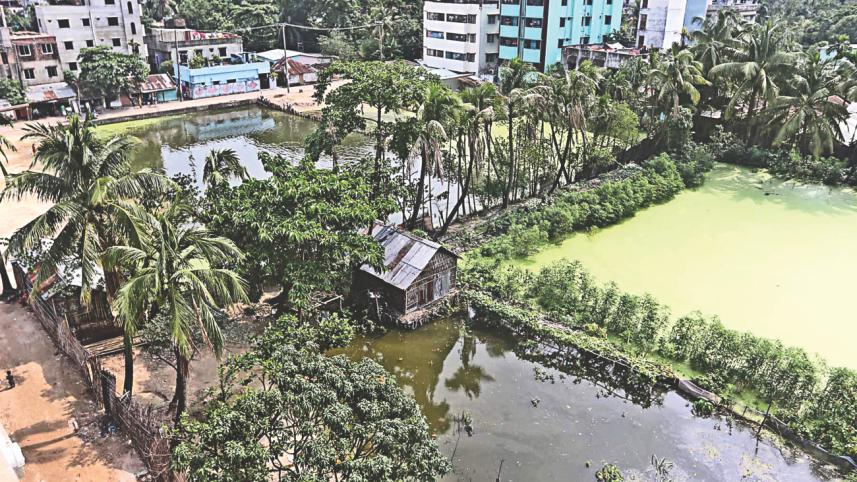Century-old Hajar Dighi of port city in peril

The High Court also ordered on June 7 a stop to filling the family-owned pond, following a writ petition of Bangladesh Environmental Lawyers Association (BELA).
Owners of Hajar Dighi, a century-old pond in Chittagong city, have filled nearly half of it with earth, defying law and an order by the Department of Environment (DoE).
The High Court also ordered on June 7 a stop to filling the family-owned pond, following a writ petition of Bangladesh Environmental Lawyers Association (BELA).
The court issued a rule upon DoE's director general, secretary of the Ministry of Environment and Forests, and owners of the pond to explain why the original shape of the water body at Halishahar Middle Rampur should not be restored, said Anwarul Islam, coordinator of BELA, Chittagong.
According to a case filed by the DoE on April 21, Abu Taher Mia, Abu Taleb Mia, Shamim Mia, Selim Mia, Asif Mia, and Abu Sufian have filled their portions.
However, Taher and Taleb died years ago, while two other owners -- Iqbal Shofi and Anwarul Beg Babul -- whose names were not included in the complaint also filled their portions.
Asked about it, DoE Assistant Director Khandokar Mohammad Tahajut Ali, also investigation officer of the case, said, "Some may be acquitted of charges and some may be included in the charge sheet later."
A 15-room tin-roof house has already been built by Taher's sons Ershad, Osman and Murshed on the western side of the pond and rented out.
The 1.91 acre pond is an ancestral property of the owners who started the earth filling in March, locals said.
A DoE team visited the spot on April 2 and issued written orders on the owners individually not to fill the water body which they defied prompting it to file the case.
Even after being sued, the owners continued dumping earth at night, said locals.
"We do not get water from Wasa regularly and have to depend on the pond for cooking and household chores. If it is destroyed, we will have to buy water," said Rabeya Begum, a resident of the area facing a severe water crisis.
Mohammed Mohiuddin said, "We don't know whether we can bathe in the pond anymore."
Mamunul Islam, who used to frequent the pond to enjoy cool breezes on its banks, said, "It's no longer as attractive as before."
According to the Bangladesh Environment Preservation Act 1995 (Amended in 2010), the accused can be jailed for two years or fined Tk 2 lakh or both if they change the natural shape of any water body as mentioned in the government documents.
They will be sentenced to two to 10 years' imprisonment or fined Tk 2 lakh to Tk 10 lakh or both for recurrence of the offence each time.
Moreover, the Chittagong Development Authority's detailed area plan states of preservation of any water body which is more than 0.5 acres.
Anwarul, a lawyer at Chittagong district judge's court, said, "To the best of my knowledge there is no provision of compensation for the owners of any water body though law prohibits filling or changing those."
Ershad, one of the owners, declined to comment, while Abu Sufian said they could not manage the pond or benefit from it as their house was five to six kilometres off the spot. "Locals steal fish from the pond," he added.
Iqbal Shofi said he would build a picnic spot on 8,000 sq ft of the portion filled so far but would not fill the rest.



 For all latest news, follow The Daily Star's Google News channel.
For all latest news, follow The Daily Star's Google News channel.
Comments